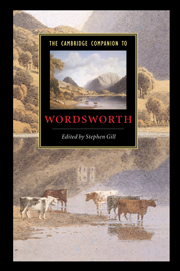Book contents
- Frontmatter
- Introduction
- 1 Wordsworth: the shape of the poetic career
- 2 Wordsworth's poetry to 1798
- 3 Poetry 1798-1807
- 4 'The noble living and the noble dead'
- 5 Wordsworth and The Recluse
- 6 Wordsworth and the meaning of taste
- 7 Wordsworth's craft
- 8 Gender and domesticity
- 9 The philosophic poet
- 10 Wordsworth and Coleridge
- 11 Wordsworth and the natural world
- 12 Politics, history, and Wordsworth's poems
- 13 Wordsworth and Romanticism
- 14 Wordsworth and America
- 15 Textual issues and a guide to further reading
- Index
- Series List
Introduction
Published online by Cambridge University Press: 28 May 2006
- Frontmatter
- Introduction
- 1 Wordsworth: the shape of the poetic career
- 2 Wordsworth's poetry to 1798
- 3 Poetry 1798-1807
- 4 'The noble living and the noble dead'
- 5 Wordsworth and The Recluse
- 6 Wordsworth and the meaning of taste
- 7 Wordsworth's craft
- 8 Gender and domesticity
- 9 The philosophic poet
- 10 Wordsworth and Coleridge
- 11 Wordsworth and the natural world
- 12 Politics, history, and Wordsworth's poems
- 13 Wordsworth and Romanticism
- 14 Wordsworth and America
- 15 Textual issues and a guide to further reading
- Index
- Series List
Summary
After struggling in his middle years to win more than a coterie readership, William Wordsworth lived to savour success. He died full of honours in 1850, Poet Laureate to Queen Victoria, a man recognized, in John Keble's words, as 'raised up to be a chief minister, not only of noblest poesy, but of high and sacred truth'. Over the next fifty years his status as an English classic was confirmed in innumerable printings of his works, anthologies, and eventually scholarly studies. By 1950, however, it seemed that his time was over. At an event to mark the centenary of Wordsworth's death, Lionel Trilling, one of the foremost American critics of his generation, summed up what he took to be the current perception of the poet: 'Wordsworth is not attractive and not an intellectual possibility.' Although Trilling's lecture went on to demonstrate that this was not his own view, his decisive and memorable formulation sounded right, as if Keble's words on the plaque in Grasmere Church were being given their sad but inevitable addendum. But such has not been the judgement of history. Since the muted celebrations in 1950, shifts in intellectual concerns have brought the Romantics into new focus and have rediscovered Wordsworth as a fully 'intellectually possible' figure. Western culture's preoccupation with identity and the self; the linguistic turn of much current theory; the interest in power and politics and nationhood; the return to history; environmental issues - all of these dominant features of the cultural landscape of the last half-century have been mapped across the terrain of Wordsworth's poetry and prose.
- Type
- Chapter
- Information
- The Cambridge Companion to Wordsworth , pp. 1 - 4Publisher: Cambridge University PressPrint publication year: 2003
- 1
- Cited by



